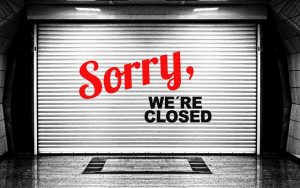Should You Close Your Business?
To a business broker, that’s a ridiculous question! In almost 100% of the cases, you should sell your business, even it is not profitable. Why? Because it almost certainly has value – and by closing the business, you’re walking away from that value. Should you close your business? Not bloody likely, mate!
 Very few small business owners have planned for their exit. Even in the middle market, the majority of owners has not prepared for the time they’ll retire. And almost nobody thinks they going to get sick – but it happens all the time. As a result, when it comes time to retire or move on to the next challenge – or, worse, some calamity hits – some owners think that they have no choice but to close. Not true!
Very few small business owners have planned for their exit. Even in the middle market, the majority of owners has not prepared for the time they’ll retire. And almost nobody thinks they going to get sick – but it happens all the time. As a result, when it comes time to retire or move on to the next challenge – or, worse, some calamity hits – some owners think that they have no choice but to close. Not true!
Even a business that is not profitable may have value – if not to people in the general business-buying market, perhaps to a competitor. Client lists, proprietary processes or software; even inventory; all this will have value – and if the business is not significantly profitable, its highest value is likely to a competitor or a turnaround specialist. Whether the business is large or small, selling it is the first option you should consider.
By way of example, one of our offices listed a small service company for sale. The owner had gotten ill suddenly and had not planned for this possibility – or even for retirement. This was a very small business – but one that had provided a handsome living to the owner and his family. It was also in a very specialized field. Given the owner’s unexpected health crisis and lack of planning, his family was considering simply closing the business down. Fortunately for them, they were referred to us.
 Because of the owner’s serious health problems and the lack of preparation for business continuity, his family wanted to find a buyer as quickly as possible. With most businesses, that means setting a price that would be seen as a very good deal for a buyer. But because the business was so specialized, a quick sale probably meant selling to a competitor.
Because of the owner’s serious health problems and the lack of preparation for business continuity, his family wanted to find a buyer as quickly as possible. With most businesses, that means setting a price that would be seen as a very good deal for a buyer. But because the business was so specialized, a quick sale probably meant selling to a competitor.
We were able to convince the family that the business had value – at least in the short term (a business that is not operating losses value very rapidly). Our broker did a valuation and the owner’s family agreed to list the business at that price. Our broker made the argument that in order to get a quick sale, the likely buyer was a competitor – someone that would not need to learn about the market, conduct in-depth due diligence, learn how to run the business, etc. The family, reluctantly, recognized the wisdom in that strategy and agreed.
In our example, though our broker put the listing up on our website and the subscription sites we use in the marketing of the businesses we list, as well as made our many co-brokering partners aware of the opportunity, he also researched the industry and, using one of the databases we subscribe to, found roughly 40 similar businesses within a six-hundred mile radius of the subject business and contacted them all – each a competitor. The offer came from from one of these competing businesses.
This kind of stuff happens to larger businesses, as well – particularly those that have a thin management team. The following example from our files is one I’ll not easily forget.
Back on 2004, a woman contacted me about the possibility of selling a specialty manufacturing business that her husband had started more than 20 years earlier. At the time, the business had annual revenue of roughly $6.5 million and the owner netted about $1.4 million. The business ran lean and mean – no superfluous management layers. In fact, to everyone’s eventual dismay, no management at all except for the owner.
He had gotten very sick and had been in the hospital for weeks. His wife, who did nothing more than keep the books, and his foreman, his only full-time employee, tried their best to keep the business alive. Because the owner was so well liked, most of his long-time customers were supportive and loyal – at least to the extent that their business wasn’t negatively impacted.
 The owner and his wife seriously considered closing the business – more than 20 years would have gone down the drain! But the business, even though it was specialized and even as it suffered through the owner’s absence, had value and that value was significantly more than “auction” value.
The owner and his wife seriously considered closing the business – more than 20 years would have gone down the drain! But the business, even though it was specialized and even as it suffered through the owner’s absence, had value and that value was significantly more than “auction” value.
Think about it for a minute. The business had good books that the wife could explain. It had a loyal and dedicated foreman and talented, albeit independent contractor mechanics. It had a sterling reputation for quality and service. It had tens of thousands of dollars of equipment. With all that, there were two possible buyer categories.
The first was someone experienced in the industry that would see an opportunity to go out on their own with an excellent business as the vehicle. The second was a competitor, of which there were three logical choices in the general geographic area. We provided our opinion of value and found a buyer that saw that value. The buyer, a competitor, executed a friendly takeover, expanding its footprint, adding clients to its roster, saving jobs in the community and, most important for the owner (who, thankfully, survived), his wife and their family, provided a handsome return to the owner for the work he did building a long-lasting business over more than 20 years.
The owner and his wife were on the verge of closing their business because, given his grave illness, they saw no alternative. Whether this business was generating a handsome profit of not, it had value in the assets – tangible and intangible – mentioned above. Closing would have obliterated 90% of that value.
This all underscores how important exit planning is for any business, no matter its size. Such consideration is a facet of business ownership that is usually overlooked but is arguably the most important aspect of business planning. When you have a plan and something happens to you, your family, heirs, executors, etc will be in a much better position to be able to dispose of the asset in an orderly manner – and to realize its value. Without that plan, chaos is likely to ensue and there’s no telling if anyone will ever get any value out of what you may have spent a lifetime building.
We’ve long advocated exit planning, a process that maps out how and when the business will be sold (or transferred) and how to realize the highest value for the seller. Ideally, this is a process that is considered at the earliest stages of the business – at start up, even; or when the current owner buys it – but in no event less than three years before the owner begins looking for a buyer.
But even if you don’t plan, you should always think of selling before closing your business.
It is surprising to us whenever we hear that someone has closed or is closing their business. We have yet to hear a good reason for this. Amazingly, some people still don’t understand that businesses are sold everyday. I, personally, have been asked what I do and, when I answer that I’m a business broker – that I sell businesses and make a handsome living doing so – I have gotten a look that suggests that a light had just been turned on. Many people still don’t realize that businesses are bought and sold all the time.
Before Closing Your Business, Get Some Professional Advice
To make sure that you don’t end up in the same situation as the owners in the two examples above, planning is imperative. But even if your business is only marginally profitable, get a professional business broker to take a look at it. You may not see the value but a good broker will be able to.
I’ve put together a list of five steps that you should take to get started with your exit planning. If you’re interested in them, you can get them for free by entering an email address that we can send them to. As soon as you hit “Get the List!”, it’ll be on it’s way to you.
If you want more information, what would be most helpful to you to get started on planning? Let me know in the Comments box, below and I’ll get back to you right away.
If you have any questions or comments on this topic or any others about buying, selling or starting a business – or about becoming a professional business broker – put them in the Comments box. I’ll get back to you with answers or my own comments. If I get enough on one topic, I’ll address them in a future post or podcast.
I’ll be back with you again next Monday. In the meantime, I hope you have a profitable week!
Joe
The author holds a certification from the International Business Brokers Association (IBBA) as a Certified Business Intermediary (CBI) and can be reached at
jo*@Wo*******************.com
